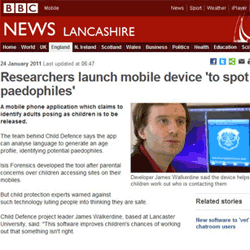Recent Stories
- Businesses urged to tap into science and technology young talent
- Digital relay baton enables remote crowd cheering of athletes
- Health Innovation Campus moves a step closer
- £7.1 million R&D boost for North West businesses
- Centre of excellence created for the next industrial revolution
- Artificial intelligence toolkit spots new child sexual abuse media online
- Strategic partnership set to help plug cyber security skills gap
- What your choice of smartphone says about you
- InfoLabTree: Discover the Story
- novi.digital Launch Event - 'An Event to Help Businesses Grow Online'
RSS Feeds
RSS feeds can deliver the latest InfoLab21 news and events direct to your browser without you having to visit the website.
In most browsers you can click on an RSS link and choose to subscribe to the feed to add it to your favourites or bookmarks.
Mobile Phone Software To Help Keep Kids Safe
Story supplied by LU Press Office
 Dr James Walkerdine of Isis Forensics (image of courtesy of BBC Online)
Dr James Walkerdine of Isis Forensics (image of courtesy of BBC Online)
Children who use social media on their mobile phones can now check their friends really are who they say they are, thanks to new mobile phone software.
The software, which is called Child Defence, enables kids to scan webchat on their mobile to check the age of people they are messaging - potentially protecting them from being groomed by adults posing as children online. Whereas most child protection software will monitor a kid's online activity and be controlled by the parents, this new software empowers kids to protect themselves.
Researchers at Isis Forensics, a Lancaster University spin out company based in InfoLab21, have been developing the tool in consultation with children and parents in the North West, specifically for use on mobile phones.
From Facebook to SMS, recent years have seen a major social networking boom on the internet and children are increasingly accessing these networks using mobile devices such as mobile phones and iPads.
These developments offer huge opportunities to young people but also pose risks. Predators on the internet can abuse social networks, assuming different identities to target vulnerable children and groom them for abuse - both online and in the real world.
The software uses the latest advances in language analysis technology to identify language quirks peculiar to different age groups. It can also link in with websites such as Facebook and Twitter, allowing children to scan chat text from their site. It enables children to build up profiles of individuals who they are chatting to online.
Previously, such analysis would have to be done on powerful servers - but because the software has been specifically designed to work on mobile phones, young people and their parents can scan text themselves. This means that personal data does not have to be sent to a third party server for analysis.
Initial evaluation found that the software used on Child Defence was at least as good at determining if an adult is masquerading as a child as the server-based alternatives, with it correctly identifying all the masquerading adults in a recent trial. The software is currently undergoing final testing before being made freely available as iPhone, Google and Nokia phone apps.
James Walkerdine of Isis Forensics said: "Nothing can take the place of education and parental supervision when it comes to keeping children safe online. But with more and more young people accessing the web on mobile devices away from home or in the privacy of their rooms we think it is important to give children as many tools as possible to protect them from harm.
"Our research shows that children find it very difficult to spot adults posing as children on social networks. This software improves children's chances of working out that something isn't right. Using state of the art language analysis software it gives children a powerful tool which can help them work out who they are really talking to online.
"Parents in our focus groups told us they would much prefer to see software solutions that empowered and educated their children to help them protect themselves."
Steve Riches, Director of InfoLab21's Knowledge Business Centre said: "The internet plays an ever-increasing part in our daily lives and it is essential that children are safe to realise its full benefit. Child Defence has the full support of the KBC team and is a great example of the social impact that technology can have. We must give full credit to James and his team for providing the mechanism to both empower children, but more significantly help to eliminate the potential threat of predatory forces that use the internet to exploit one of the most vulnerable groups in our community".
Work on the mobile phone software was carried out as part of a project co-funded by the Northwest Regional Development Agency.
Mon 31 January 2011



